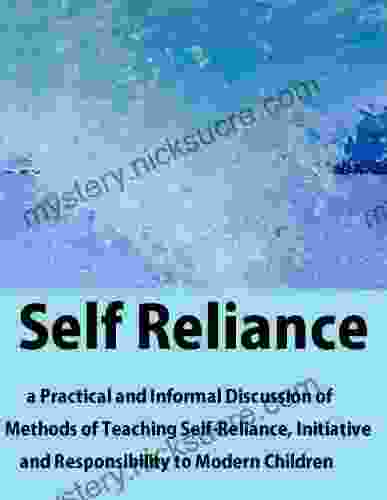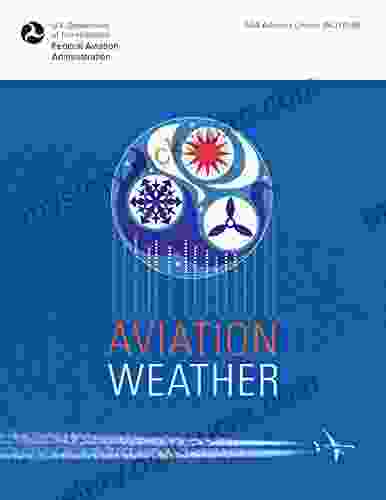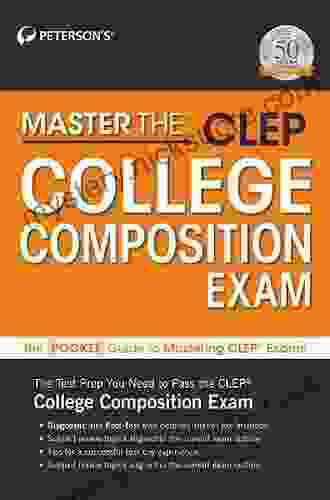A Practical and Informal Discussion of Methods of Teaching Self-Reliance

4.7 out of 5
| Language | : | English |
| File size | : | 660 KB |
| Text-to-Speech | : | Enabled |
| Screen Reader | : | Supported |
| Enhanced typesetting | : | Enabled |
| Word Wise | : | Enabled |
| Print length | : | 280 pages |
| Lending | : | Enabled |
Self-reliance is a valuable trait that can help individuals thrive in all aspects of life. It allows them to be more independent, confident, and resilient. While some people may be naturally more self-reliant than others, it is a skill that can be learned and developed over time.
There are many different ways to teach self-reliance. Some of the most effective methods are practical and informal. These methods can be used in a variety of settings, such as at home, in school, or in the workplace.
Practical Methods of Teaching Self-Reliance
- Encourage children to help with age-appropriate tasks around the house. Even young children can help with simple tasks such as setting the table, clearing their plates, or putting away their toys. As children get older, they can be given more responsibilities, such as helping to cook meals, do laundry, or mow the lawn. Giving children opportunities to help out around the house teaches them valuable life skills and helps them to feel more capable and independent.
- Provide children with opportunities to make choices. When children are given choices, they learn to think for themselves and make decisions. This can be as simple as letting them choose what to wear for the day or what to have for breakfast. As children get older, they can be given more important choices, such as choosing their own extracurricular activities or deciding how to spend their allowance.
- Allow children to make mistakes. Mistakes are a natural part of learning. When children make mistakes, they should be allowed to learn from them and try again. This teaches them that it is okay to fail and that they should not give up. It also helps them to develop resilience and problem-solving skills.
- Praise children for their efforts, not just their accomplishments. When children are praised for their efforts, they learn that it is the process of learning that is important, not just the end result. This helps them to develop a growth mindset and to believe that they can improve their abilities through hard work.
- Model self-reliance. Children learn by watching the adults in their lives. If they see that their parents or other adults are self-reliant, they are more likely to become self-reliant themselves. This means being independent, confident, and resourceful. It also means being willing to take risks and to learn from your mistakes.
Informal Methods of Teaching Self-Reliance
- Encourage children to play independently. Play is an important way for children to learn and develop. When children play independently, they learn to entertain themselves, to solve problems, and to be creative. They also learn to rely on themselves and to make their own decisions.
- Provide children with opportunities to learn from their peers. Children can learn a lot from each other. When they play together, they learn to cooperate, to resolve conflicts, and to share ideas. They also learn to be more independent and to rely less on adults.
- Encourage children to participate in extracurricular activities. Extracurricular activities can provide children with opportunities to develop new skills, to make friends, and to learn how to work as part of a team. They can also help children to develop their self-confidence and their sense of independence.
- Talk to children about self-reliance. It is important to talk to children about self-reliance and to explain why it is important. Children need to understand that self-reliance is not about being perfect or never making mistakes. It is about being able to take care of yourself and to solve problems on your own.
- Be patient and supportive. Teaching self-reliance takes time and effort. It is important to be patient and supportive with children as they learn and grow. There will be setbacks along the way, but it is important to keep encouraging children and to help them to learn from their mistakes.
Benefits of Teaching Self-Reliance
There are many benefits to teaching self-reliance. Some of the most notable benefits include:
- Increased independence
- Greater confidence
- Improved problem-solving skills
- Enhanced resilience
- Greater sense of accomplishment
Self-reliant individuals are better able to navigate life's challenges and to achieve their goals. They are more likely to be successful in school, in their careers, and in their personal lives.
Teaching self-reliance is a valuable gift that you can give to a child. It is a skill that will benefit them throughout their lives. By using practical and informal methods, you can help children to develop a sense of self-efficacy and to become more independent, confident, and resilient.
4.7 out of 5
| Language | : | English |
| File size | : | 660 KB |
| Text-to-Speech | : | Enabled |
| Screen Reader | : | Supported |
| Enhanced typesetting | : | Enabled |
| Word Wise | : | Enabled |
| Print length | : | 280 pages |
| Lending | : | Enabled |
Do you want to contribute by writing guest posts on this blog?
Please contact us and send us a resume of previous articles that you have written.
 Fiction
Fiction Non Fiction
Non Fiction Romance
Romance Mystery
Mystery Thriller
Thriller SciFi
SciFi Fantasy
Fantasy Horror
Horror Biography
Biography Selfhelp
Selfhelp Business
Business History
History Classics
Classics Poetry
Poetry Childrens
Childrens Young Adult
Young Adult Educational
Educational Cooking
Cooking Travel
Travel Lifestyle
Lifestyle Spirituality
Spirituality Health
Health Fitness
Fitness Technology
Technology Science
Science Arts
Arts Crafts
Crafts DIY
DIY Gardening
Gardening Petcare
Petcare Elisabeth Elliot
Elisabeth Elliot Richard C Francis
Richard C Francis Fiona Beddall
Fiona Beddall Bruce Watt
Bruce Watt Kevin Houston
Kevin Houston Narain Moorjani
Narain Moorjani Caleb J Tzilkowski
Caleb J Tzilkowski Stedman Graham
Stedman Graham Paul Rabinow
Paul Rabinow Jonathan T Gilliam
Jonathan T Gilliam Albert Jeremiah Beveridge
Albert Jeremiah Beveridge Nedu
Nedu George Daniel
George Daniel Carrie Hope Fletcher
Carrie Hope Fletcher Ron Rapoport
Ron Rapoport Emt Basic Exam Prep Team
Emt Basic Exam Prep Team Lewis Kirkham
Lewis Kirkham Melissa Mullamphy
Melissa Mullamphy Dory Willer
Dory Willer Ransom Riggs
Ransom Riggs R L Medina
R L Medina Stacey Rourke
Stacey Rourke Hugh Aldersey Williams
Hugh Aldersey Williams Michael Chatfield
Michael Chatfield Joe Baker
Joe Baker Joanne V Hickey
Joanne V Hickey Charles Staley
Charles Staley Robert Moor
Robert Moor Bryce Carlson
Bryce Carlson Kelly Rowland
Kelly Rowland Ivy Hope
Ivy Hope Marla Taviano
Marla Taviano Jim Kempton
Jim Kempton C F Crist
C F Crist Robert D Gibbons
Robert D Gibbons Gary Lewis
Gary Lewis Kacen Callender
Kacen Callender Robert Edward Grant
Robert Edward Grant Cecil B Hartley
Cecil B Hartley Gary Mayes
Gary Mayes Marcia Scheiner
Marcia Scheiner Judith Merkle Riley
Judith Merkle Riley C J Archer
C J Archer Maurice J Thompson
Maurice J Thompson Ivar Dedekam
Ivar Dedekam Kevin Howell
Kevin Howell Carole Bouchard
Carole Bouchard Romola Anderson
Romola Anderson Oliver Sacks
Oliver Sacks Janet Evans
Janet Evans Dina Nayeri
Dina Nayeri Jack Canfield
Jack Canfield Fmg Publications Special Edition
Fmg Publications Special Edition David Martin
David Martin Greg W Prince
Greg W Prince John H Falk
John H Falk Roger J Davies
Roger J Davies Meghan Daum
Meghan Daum Maren Stoffels
Maren Stoffels C S Lewis
C S Lewis Jared Diamond
Jared Diamond Wilhelm Reich
Wilhelm Reich Matthew Marchon
Matthew Marchon Valliappa Lakshmanan
Valliappa Lakshmanan Ian Leslie
Ian Leslie C M Carney
C M Carney Richard Drake
Richard Drake Theodora Papatheodorou
Theodora Papatheodorou Mike X Cohen
Mike X Cohen Hibiki Yamazaki
Hibiki Yamazaki Elizabeth Laing Thompson
Elizabeth Laing Thompson Albert Rutherford
Albert Rutherford Jack Disbrow Gunther
Jack Disbrow Gunther David Tanis
David Tanis Tamara Ferguson
Tamara Ferguson Bruce Van Brunt
Bruce Van Brunt Sheri Morehouse
Sheri Morehouse Rebecca Musser
Rebecca Musser Jennifer L Scott
Jennifer L Scott Sam Priestley
Sam Priestley Donna Goldberg
Donna Goldberg K C Cole
K C Cole Daniel Prince
Daniel Prince Lingo Mastery
Lingo Mastery Hecateus Apuliensis
Hecateus Apuliensis Richard Henry Dana
Richard Henry Dana Shelby Hailstone Law
Shelby Hailstone Law Paul A Offit
Paul A Offit Elaine Tyler May
Elaine Tyler May John R Mabry
John R Mabry Jennifer Rose
Jennifer Rose Winky Lewis
Winky Lewis Scott Mactavish
Scott Mactavish Shea Ernshaw
Shea Ernshaw Scott Hartshorn
Scott Hartshorn Jessica Howard
Jessica Howard Frederick Jackson Turner
Frederick Jackson Turner Luc Mehl
Luc Mehl Kindle Edition
Kindle Edition John Kretschmer
John Kretschmer Katharine Mcgee
Katharine Mcgee L W Jacobs
L W Jacobs Mcgraw Hill
Mcgraw Hill Tony E Adams
Tony E Adams Phil Williams
Phil Williams Katherine D Kinzler
Katherine D Kinzler Celeste Headlee
Celeste Headlee Paul Lobo
Paul Lobo Sylvia Williams Dabney
Sylvia Williams Dabney Peter Bodo
Peter Bodo Phil Bourque
Phil Bourque Don S Lemons
Don S Lemons Richard W Voelz
Richard W Voelz Jasmine Shao
Jasmine Shao Buddy Levy
Buddy Levy Nick Tumminello
Nick Tumminello Martin Davies
Martin Davies Eric P Lane
Eric P Lane Terry Laughlin
Terry Laughlin Jessica Holsman
Jessica Holsman Martina D Antiochia
Martina D Antiochia Matthew Warner Osborn
Matthew Warner Osborn Heather Jacobson
Heather Jacobson Tey Meadow
Tey Meadow Michael A Tompkins
Michael A Tompkins Frank Muir
Frank Muir Ronald T Potter Efron
Ronald T Potter Efron Julietta Suzuki
Julietta Suzuki Pam Flowers
Pam Flowers Stella Cottrell
Stella Cottrell Melanie Anne Phillips
Melanie Anne Phillips Julie Golob
Julie Golob Gregory A Kompes
Gregory A Kompes Nick Gamis
Nick Gamis Darcy Lever
Darcy Lever Lois Lowry
Lois Lowry Lauren Manoy
Lauren Manoy Douglas P Fry
Douglas P Fry Db King
Db King Upton Sinclair
Upton Sinclair Justin Coulson
Justin Coulson James Beard
James Beard Della Ata Khoury
Della Ata Khoury Joyceen S Boyle
Joyceen S Boyle Susan Garcia
Susan Garcia Nicolas Bergeron
Nicolas Bergeron Jim Wiese
Jim Wiese Lily Raff Mccaulou
Lily Raff Mccaulou Nawuth Keat
Nawuth Keat Duncan Steel
Duncan Steel Robert Walker
Robert Walker Donna R Causey
Donna R Causey Dave Bosanko
Dave Bosanko Freya Pickard
Freya Pickard Steven W Dulan
Steven W Dulan Lina K Lapina
Lina K Lapina William Ellet
William Ellet Jim Supica
Jim Supica Wyatt Mcspadden
Wyatt Mcspadden Matt Baglio
Matt Baglio Niels H Lauersen
Niels H Lauersen Ashley Eckstein
Ashley Eckstein Sarah Prager
Sarah Prager Tom Cunliffe
Tom Cunliffe Shaunti Feldhahn
Shaunti Feldhahn John Jamieson
John Jamieson Mona Bijjani
Mona Bijjani Suzanne Young
Suzanne Young Kathy Woods
Kathy Woods Erin Beaty
Erin Beaty Dennis Adler
Dennis Adler Tricia Levenseller
Tricia Levenseller Maria Van Noord
Maria Van Noord Simon Michael Prior
Simon Michael Prior Jeff Scheetz
Jeff Scheetz Kevin Panetta
Kevin Panetta Guy Grieve
Guy Grieve Eugenia G Kelman
Eugenia G Kelman John M Marzluff
John M Marzluff David Eagleman
David Eagleman Om Krishna Uprety
Om Krishna Uprety Lily Field
Lily Field Jeffrey L Kohanek
Jeffrey L Kohanek Lianna Marie
Lianna Marie Heather Balogh Rochfort
Heather Balogh Rochfort Lsat Unplugged
Lsat Unplugged Aaron Reed
Aaron Reed Tibor Rutar
Tibor Rutar Richard Harding Davis
Richard Harding Davis Rob Pate
Rob Pate Rita Golden Gelman
Rita Golden Gelman Lottie Bildirici
Lottie Bildirici Nicola Yoon
Nicola Yoon Richard Barrett
Richard Barrett Jim Al Khalili
Jim Al Khalili Sarah Jacoby
Sarah Jacoby Robert Garland
Robert Garland Valerie Poore
Valerie Poore Lynn Butler Kisber
Lynn Butler Kisber Jimmy Chin
Jimmy Chin Elizabeth Anne Wood
Elizabeth Anne Wood Larry Larsen
Larry Larsen James Miller
James Miller Sandra Niche
Sandra Niche Thomas Achatz
Thomas Achatz Philippe Karl
Philippe Karl Dave Rearick
Dave Rearick Maha Alkurdi
Maha Alkurdi Sophie Messager
Sophie Messager Vivian Foster
Vivian Foster Lew Freedman
Lew Freedman Carrie Marie Bratley
Carrie Marie Bratley Robert Larrison
Robert Larrison Pamela Weintraub
Pamela Weintraub Elizabeth May
Elizabeth May John H Cunningham
John H Cunningham Megan Miller
Megan Miller Keith Brewer
Keith Brewer Jill Angie
Jill Angie Jason Runkel Sperling
Jason Runkel Sperling Kruti Joshi
Kruti Joshi Shmuel Goldberg
Shmuel Goldberg Shawna Richer
Shawna Richer Scott Mcmillion
Scott Mcmillion Susan Frederick Gray
Susan Frederick Gray Leon Speroff
Leon Speroff Kyra Phillips
Kyra Phillips Nikki Carroll
Nikki Carroll John Vince
John Vince R Scott Thornton
R Scott Thornton Lucy Cooke
Lucy Cooke Ian Tuhovsky
Ian Tuhovsky Richard Bullivant
Richard Bullivant David Cannon
David Cannon Issai Chozanshi
Issai Chozanshi Ruthellen Josselson
Ruthellen Josselson Eric R Dodge
Eric R Dodge Ivan Gridin
Ivan Gridin Sarah Baker
Sarah Baker Shyima Hall
Shyima Hall Craig Martelle
Craig Martelle Pat Rigsby
Pat Rigsby Cal Newport
Cal Newport Katie Fallon
Katie Fallon Bruce W Harris
Bruce W Harris Jess J James
Jess J James Elmer Keith
Elmer Keith Douglas Preston
Douglas Preston Peterson S
Peterson S John J Ratey
John J Ratey Nigel Cawthorne
Nigel Cawthorne Marc Bona
Marc Bona Jesse Romero
Jesse Romero Kat Davis
Kat Davis Declan Lyons
Declan Lyons Chris Bonington
Chris Bonington Helen Webster
Helen Webster Simon A Rego
Simon A Rego Caitlyn Dare
Caitlyn Dare Nicholas Tomalin
Nicholas Tomalin Caroline Manta
Caroline Manta Vladimir Lossky
Vladimir Lossky Ken Schwaber
Ken Schwaber Kaplan Test Prep
Kaplan Test Prep Emma Warren
Emma Warren Jim West
Jim West Victoria Honeybourne
Victoria Honeybourne Stian Christophersen
Stian Christophersen Charles Salzberg
Charles Salzberg Emily Lowry
Emily Lowry Earl G Williams
Earl G Williams William Rathje
William Rathje J Maarten Troost
J Maarten Troost Sherri L Jackson
Sherri L Jackson Graham Norton
Graham Norton Lee Alan Dugatkin
Lee Alan Dugatkin John Grehan
John Grehan David Savedge
David Savedge Dan Romanchik Kb6nu
Dan Romanchik Kb6nu Veronica Eden
Veronica Eden Law School Admission Council
Law School Admission Council Tim Glover
Tim Glover Konstantinos Mylonas
Konstantinos Mylonas Paige Powers
Paige Powers E W Barton Wright
E W Barton Wright Mary Pagones
Mary Pagones Carmen Davenport
Carmen Davenport Malika Grayson
Malika Grayson Byron L Reeder
Byron L Reeder Jamie Marich
Jamie Marich Joanne Kimes
Joanne Kimes Kevin A Morrison
Kevin A Morrison Michael Gurian
Michael Gurian Philip Purser Hallard
Philip Purser Hallard Dan Flores
Dan Flores Collins Easy Learning
Collins Easy Learning Sterling Test Prep
Sterling Test Prep Michael Lear Hynson
Michael Lear Hynson Scott Cawthon
Scott Cawthon Dvora Meyers
Dvora Meyers Tyler Trent
Tyler Trent Diane Lindsey Reeves
Diane Lindsey Reeves Joseph Moss
Joseph Moss Dounya Awada
Dounya Awada Sallyann Beresford
Sallyann Beresford Leslie A Sams
Leslie A Sams Henry Malone
Henry Malone Arrl Inc
Arrl Inc Barbara Acello
Barbara Acello Winslow Tudor
Winslow Tudor Natasha Daniels
Natasha Daniels Wayne Coffey
Wayne Coffey Denise May Levenick
Denise May Levenick James Goi Jr
James Goi Jr Rick Trickett
Rick Trickett Silvia Dunn
Silvia Dunn Leslie R Schover
Leslie R Schover Troy Horne
Troy Horne Mark Young
Mark Young Zachery Knowles
Zachery Knowles Warwick Deeping
Warwick Deeping Ira K Wolf
Ira K Wolf William Wood
William Wood Howard E Mccurdy
Howard E Mccurdy Bruce Sutherland
Bruce Sutherland Meriwether Lewis
Meriwether Lewis Tom Bass
Tom Bass Nicola S Dorrington
Nicola S Dorrington Jennifer Appel
Jennifer Appel Michael Mewshaw
Michael Mewshaw Emily Writes
Emily Writes Healthfit Publishing
Healthfit Publishing Laurie Notaro
Laurie Notaro Matt Racine
Matt Racine Michael D Alessio
Michael D Alessio Mathew Orton
Mathew Orton Chad Eastham
Chad Eastham Sara Gaviria
Sara Gaviria W D Wetherell
W D Wetherell Ralph Galeano
Ralph Galeano William L Sullivan
William L Sullivan Marisa Peer
Marisa Peer Marc Van Den Bergh
Marc Van Den Bergh Linda Rosenkrantz
Linda Rosenkrantz Vincent Chidindu Asogwa
Vincent Chidindu Asogwa Thomas Deetjen
Thomas Deetjen Cassandra Mack
Cassandra Mack Dian Olson Belanger
Dian Olson Belanger Dianne Maroney
Dianne Maroney Karen J Rooney
Karen J Rooney Tim S Grover
Tim S Grover Scarlett V Clark
Scarlett V Clark Anthony Camera
Anthony Camera Charles Sanger
Charles Sanger Craig Callender
Craig Callender Thomas Carothers
Thomas Carothers Graham Hancock
Graham Hancock Meg Cabot
Meg Cabot Sue Elvis
Sue Elvis Clement Salvadori
Clement Salvadori Tyler Burt
Tyler Burt Mary C Townsend
Mary C Townsend Doug Cook
Doug Cook The Atavist
The Atavist Cornelia Pelzer Elwood
Cornelia Pelzer Elwood Max Lugavere
Max Lugavere John Burroughs
John Burroughs Mo Gawdat
Mo Gawdat Ashley Christensen
Ashley Christensen Dorothy Canfield Fisher
Dorothy Canfield Fisher Peter J D Adamo
Peter J D Adamo Susan Orlean
Susan Orlean M E Brines
M E Brines William M Baum
William M Baum Christine Mari Inzer
Christine Mari Inzer Melissa A Priblo Chapman
Melissa A Priblo Chapman Olivier Doleuze
Olivier Doleuze Tim Freke
Tim Freke J R Harris
J R Harris Neville Goddard
Neville Goddard Don Allen Jr
Don Allen Jr Deirdre V Lovecky
Deirdre V Lovecky David Nathan Fuller
David Nathan Fuller Cameron Mcwhirter
Cameron Mcwhirter Thomas Daniels
Thomas Daniels Jim Warnock
Jim Warnock Jeff Belanger
Jeff Belanger Matt Mullenix
Matt Mullenix Ronit Irshai
Ronit Irshai Marco Wenisch
Marco Wenisch Julia Ann Clayton
Julia Ann Clayton Pia Nilsson
Pia Nilsson Lee Jackson
Lee Jackson Elena Paige
Elena Paige Veronica Roth
Veronica Roth Sophie D Coe
Sophie D Coe Max Lucado
Max Lucado Michelle Travis
Michelle Travis Samantha De Senna Fernandes
Samantha De Senna Fernandes Lynette Noni
Lynette Noni Jen Howver
Jen Howver Martina Mcbride
Martina Mcbride David Wilber
David Wilber Matt Price
Matt Price Lisa Hopp
Lisa Hopp Steven Kerry Brown
Steven Kerry Brown Bryan Litz
Bryan Litz Dick Hannula
Dick Hannula Michael Blastland
Michael Blastland Leah Zani
Leah Zani Ed Housewright
Ed Housewright Helen Zuman
Helen Zuman Trevelyan
Trevelyan William Ian Miller
William Ian Miller Erin Macy
Erin Macy Tina Schindler
Tina Schindler Orangepen Publications
Orangepen Publications Joseph Correa
Joseph Correa Sonia Shah
Sonia Shah Lisa Feldman Barrett
Lisa Feldman Barrett John Moren
John Moren Rowena Bennett
Rowena Bennett Dr Monika Chopra
Dr Monika Chopra Huberta Wiertsema
Huberta Wiertsema Sarah Berman
Sarah Berman Paul Murdin
Paul Murdin Michael Tan
Michael Tan Trevor Thomas
Trevor Thomas Carlos I Calle
Carlos I Calle Steve Guest
Steve Guest Fern Schumer Chapman
Fern Schumer Chapman J R Rain
J R Rain Stephen King
Stephen King Pedro Urvi
Pedro Urvi Robert A Cutietta
Robert A Cutietta Edward Humes
Edward Humes Nick Littlehales
Nick Littlehales Leah Hazard
Leah Hazard Mark Stavish
Mark Stavish Destiny S Harris
Destiny S Harris Jacob Erez
Jacob Erez James W Anderson
James W Anderson Joel Best
Joel Best Sheila A Sorrentino
Sheila A Sorrentino Chris Morton
Chris Morton Ron Senyor
Ron Senyor Stephen Harrison
Stephen Harrison Brandy Colbert
Brandy Colbert Elizabeth Dupart
Elizabeth Dupart Dr Tommy John
Dr Tommy John Bunmi Laditan
Bunmi Laditan Carol Inskipp
Carol Inskipp Chris Pountney
Chris Pountney J D Williams
J D Williams Ned Feehally
Ned Feehally Sarah Ockwell Smith
Sarah Ockwell Smith Jane Brocket
Jane Brocket E Ink Utilizer
E Ink Utilizer Natasha Ngan
Natasha Ngan Martha Finley
Martha Finley Charu C Aggarwal
Charu C Aggarwal Kathleen Flinn
Kathleen Flinn Maxine A Goldman
Maxine A Goldman John Flanagan
John Flanagan Ken Sande
Ken Sande Kerry H Cheever
Kerry H Cheever Kendall Rose
Kendall Rose Rand Cardwell
Rand Cardwell Roger Marshall
Roger Marshall Sammy Franco
Sammy Franco Skip Lockwood
Skip Lockwood Max Prasac
Max Prasac Norman Thelwell
Norman Thelwell Bruce Maxwell
Bruce Maxwell S M Kingdom
S M Kingdom Cathy Glass
Cathy Glass Steve Barrett
Steve Barrett Mark Hansen
Mark Hansen Tanya Hackney
Tanya Hackney Oprah Winfrey
Oprah Winfrey Mark Stanton
Mark Stanton Creek Stewart
Creek Stewart Francis Glebas
Francis Glebas
Light bulbAdvertise smarter! Our strategic ad space ensures maximum exposure. Reserve your spot today!
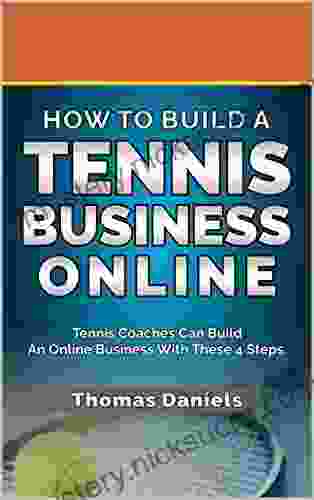
 Ethan MitchellHow to Start an Online Tennis Coaching Business: A Comprehensive Guide for...
Ethan MitchellHow to Start an Online Tennis Coaching Business: A Comprehensive Guide for...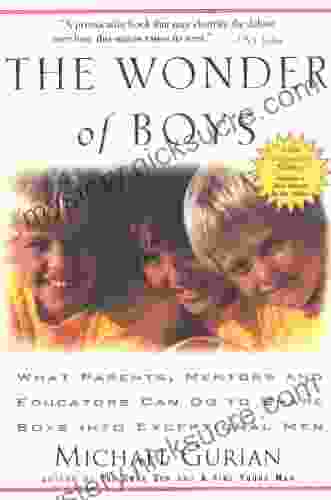
 Lawrence BellThe Wonder of Boys: Exploring the Unique Characteristics and Challenges of...
Lawrence BellThe Wonder of Boys: Exploring the Unique Characteristics and Challenges of...
 Henry HayesThe Interwoven World of Math, Technology, and Data: Unlocking Innovation and...
Henry HayesThe Interwoven World of Math, Technology, and Data: Unlocking Innovation and...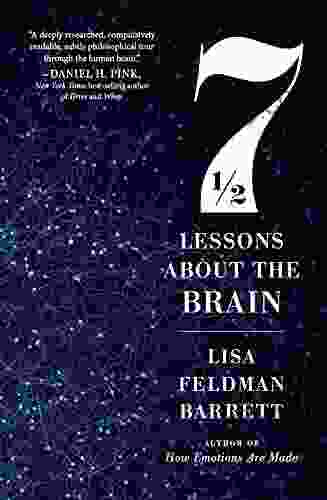
 Shane BlairSeven and a Half Lessons About the Brain: Understanding the Neuroscience of...
Shane BlairSeven and a Half Lessons About the Brain: Understanding the Neuroscience of... Clark CampbellFollow ·10.1k
Clark CampbellFollow ·10.1k Ezekiel CoxFollow ·18.3k
Ezekiel CoxFollow ·18.3k Carter HayesFollow ·7.6k
Carter HayesFollow ·7.6k Robert BrowningFollow ·9.6k
Robert BrowningFollow ·9.6k Gabriel BlairFollow ·12.5k
Gabriel BlairFollow ·12.5k Dylan HayesFollow ·6k
Dylan HayesFollow ·6k Natsume SōsekiFollow ·18.6k
Natsume SōsekiFollow ·18.6k Neil ParkerFollow ·14.4k
Neil ParkerFollow ·14.4k

 Henry David Thoreau
Henry David ThoreauHow To Bake In Unique Way: Unleash Your Culinary...
Baking is an art form that transcends the...
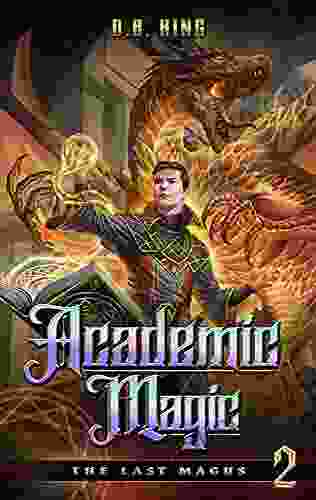
 F. Scott Fitzgerald
F. Scott FitzgeraldAcademic Magic: Unveil the Secrets of The Last Magus
Delve into a Realm of...
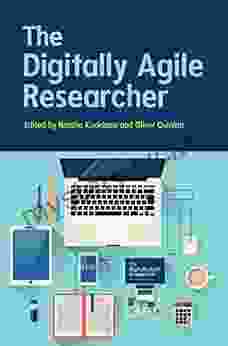
 John Green
John GreenThe Digitally Agile Researcher in UK Higher Education:...
In the rapidly...

 George Orwell
George OrwellZinc: Sources And Significance To Human Health
Zinc, an essential trace mineral, plays a...
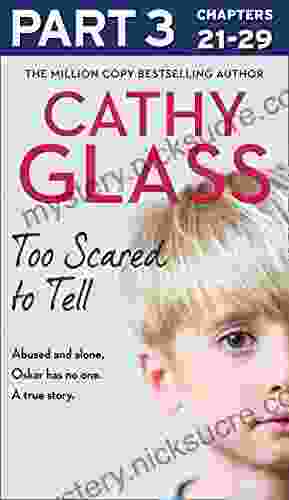
 Mario Simmons
Mario SimmonsToo Scared to Tell: A Harrowing and Thought-Provoking...
In the realm...
4.7 out of 5
| Language | : | English |
| File size | : | 660 KB |
| Text-to-Speech | : | Enabled |
| Screen Reader | : | Supported |
| Enhanced typesetting | : | Enabled |
| Word Wise | : | Enabled |
| Print length | : | 280 pages |
| Lending | : | Enabled |


